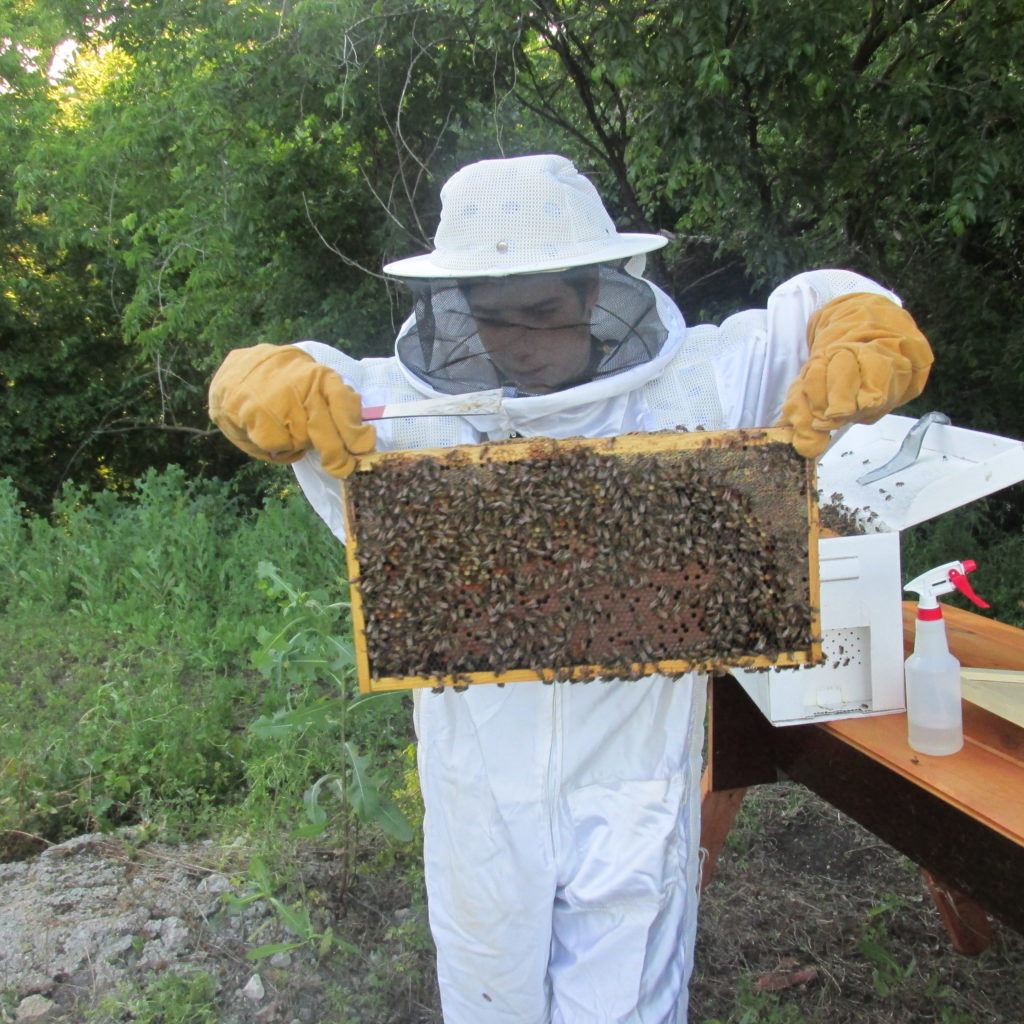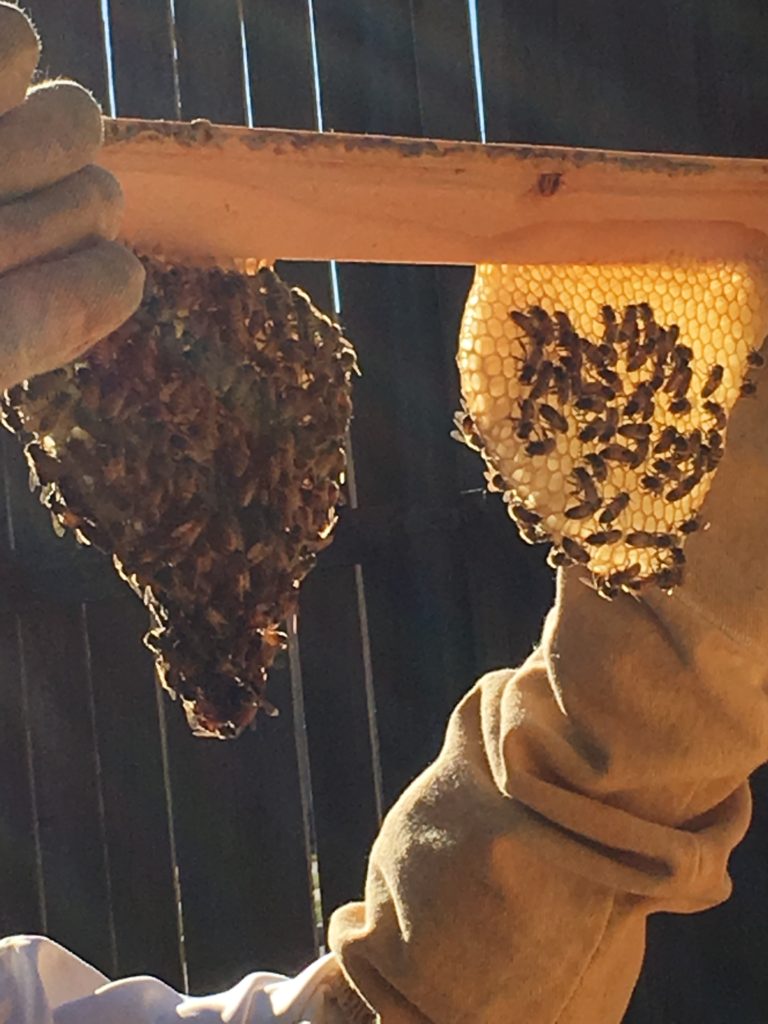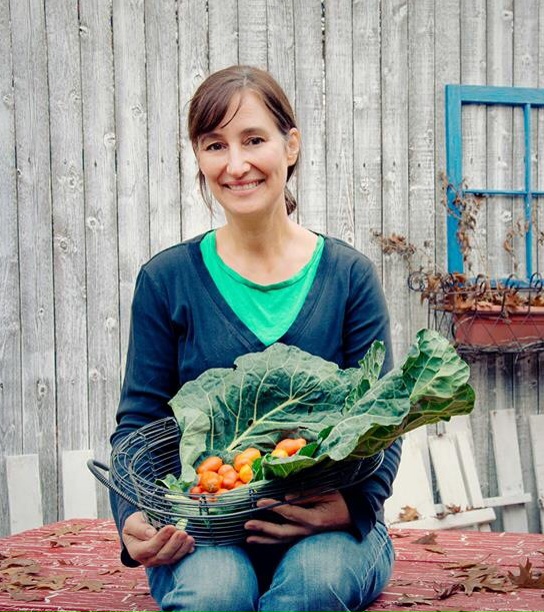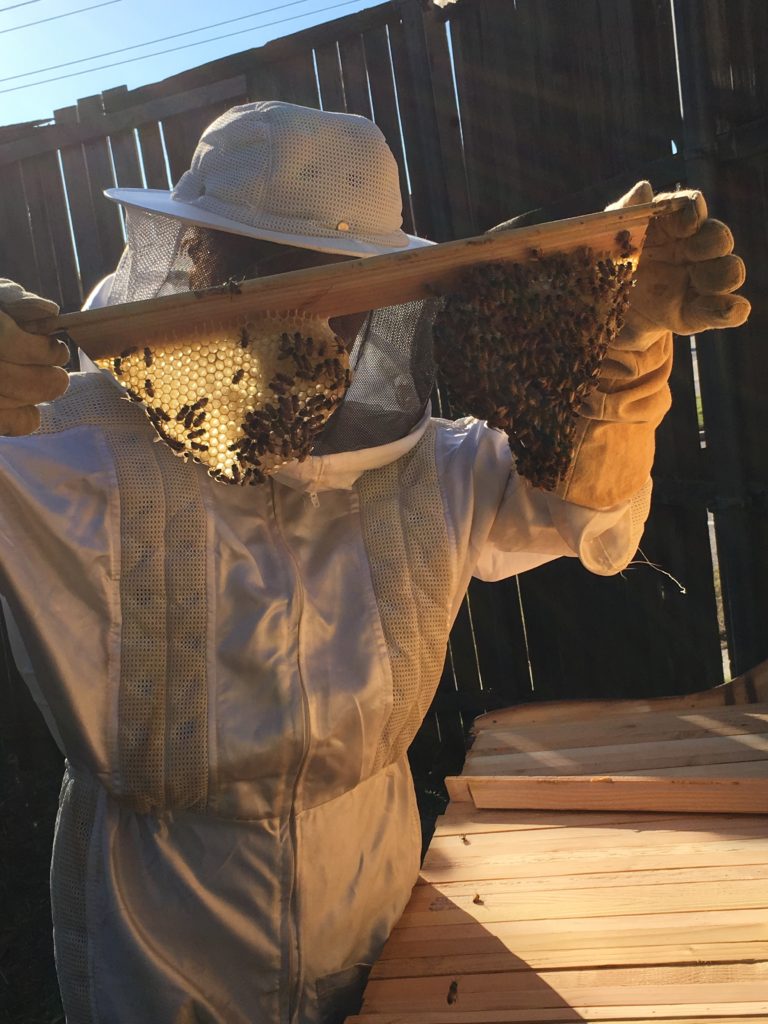Tales from Beekeeping:
My Expectations vs. the Reality
By Anne-Marie Miller
It has almost been a full year that I have been a beekeeper. It has been a fun and fascinating adventure. Painful and scary at times, but many adventures in life are like that, I have found. Looking back, my idea of what it would be like to be a beekeeper turned out to be a lot different than the actual realities of managing a hive.
First, I never expected to be in the driver’s seat for this project. Let me explain: This exhilarating hobby was my son’s idea. At 14, he is a bit of a risk-taker (to put it mildly). He wants his first paying job to be cleaning windows on a skyscraper. I think now you get the idea. He applied and was accepted for a beekeeping scholarship at Trinity Valley Beekeepers Association. I was so happy for him, congrats and all that! I was supposed to be his trusty assistant because I am not so much a risk taker, you see. However, the first time he got stung on his ankle, he had a systemic reaction in the form of all-over body hives within minutes. So, I found myself vaulted into the position of the nervous hands-on bee whisperer and he got to be the trusty assistant/photographer.
Interested in learning how you, too, can keep bees? Your local beekeeping club is the place to start. A quick Google search is all you need to find one near you. We met the most amazing people at Trinity Valley Beekeepers Association, and they were eager to answer our newbie questions. This is also the place where we found a hands-on mentor to guide us through our adventure. Take a beekeeping class. It is worth the money!
In those early and innocent days of our beekeeping adventure, I was under the naive impression that we would get our hive equipment, introduce our bees to their new home and walk away. We would of course harvest that golden nectar once or twice a year, smack our lips, lick our fingers and be very proud of ourselves and our new little buzzing friends.
My idealistic vision was not to be. I was told by my bee teacher that I must check on them. I promised her that I would check on them once a year to get our honey. No, I was supposed to check on them about every 2 or 3 weeks! “Why in the world would I want to do that?” I asked. The answer is actually a plethora of reasons, one of them being that bees nowadays have to deal with factors that they did not have to trouble with in my grandfather’s day.
For instance, the other day I was looking in on my girls and I noticed the presence of small hive beetles. These are vicious little insects that, if left untreated, will run rampant in your hive and ruin everything. Because I noticed this presence early, I could help my bees out by installing oil traps. I simply put traps in between a few frames of my hive, filled them with vegetable oil and the bees did the rest. Our clever girls herded up these little beetles and corralled them into the traps. Way to go girls!
Another pest I must watch out for is the Varroa Mite. This is an insect 10 times worse than the above hive beetles. Think of it this way—you have a baby, and noticing a humongous tick on its back! This tick would suck the literal life out of your baby. I know this is a terrible picture, but it illustrates what bees must deal with. I was told that I had to have a plan in place to deal with this mite, because it was not a matter of IF, but WHEN it would strike. There are many ways to deal with this pest. One way to cut down the number of mites in the hive is to dust your bees with powdered sugar. As the bees clean each other off they dislodge this “tick” and it falls down through the screen bottom board, which the beekeeper has strategically placed there. Then the beekeeper sits back and says, “Whew, so glad I checked!”
There are quite a few expert beekeepers that subscribe to the hands-off method of beekeeping, trusting on survival of the fittest. I get that, I truly do. However, it seems to me that this works better when you have 10 or 20 hives than when you just have that one. That one beautiful group of insects that have unwittingly worked their way into your heart, where you NEVER expected an insect to be! I even named my hive “Blondie and the Girls.” You should see this blonde colored, Italian, baby bee-laying rock star of a queen. She is royalty at its best. I think you can plainly see that I am attached. This is one of the perks, but also scary parts of beekeeping, which you, too, might encounter if you decide to dive into a backyard beekeeping adventure.
Another more positive reason I had to crack into the hive was to determine whether I had enough honey to get them through the winter. I guess before I started managing this hive I didn’t really realize that the golden, drippy honey I put on my toast wasn’t just for my enjoyment. It’s the bees’ main source of food.
You might be laughing at me, because in hindsight this seems clear. I had seen them gathering pollen as a kid, so I naturally figured this was their food source. Now, I’ve learned that although they do use the pollen to make bee bread, they also use the honey. I live in a house full of boys, so it was, of course, a natural boy leap to rename honey “bee barf.” So as the brothers bite into a bit of toast with honey on it, they can elbow each other and exclaim, “You know you are eating bee barf, right?” Yeah, perhaps you need to be surrounded by a rowdy, growing group of boys to relate to that. Just a little window into my world.
My last preconceived idea about bees is that I wouldn’t get stung. Ha, ha, ha, ha, ah ha! I could laugh and laugh about that one. Let me tell you up front that you will get stung. As long as it is not on the face or in the ear (which happened me), it is really no big deal. Purchase good protective equipment. If you live in Texas, as I do, or in Arizona, purchase thick leather gloves. Yes, they can sting right through those canvas ones. Down South we have a special gene pool of African bees that might be a bit more defensive than most. Nothing to be afraid of, just suit up well until you know what you are dealing with. On the plus side, if they have their defenses on when it comes to you, they sure as hell can handle a hive beetle or two! Wherever you are, keep in mind that you are handling a group of girls that can be a bit moody from time to time. The more experienced you are at dealing with hormonal females the better off you will be. Men, you might have the advantage here. Just my take on the matter.
Although beekeeping isn’t anything like I had imagined, it is a hobby I find fascinating, captivating, heart-wrenching and fun! You can now see that it is like a dance, a slow dance between the bees and me. I am checking and helping and learning. I am letting them take the lead. The girls are just doing their thang. Beekeeping is like glimpsing into a miracle every couple of weeks. I will always remember the first time I set eyes on “Blondie,” the queen of my hive. She looked much different than the rest with her elongated abdomen. I will never forget the first time I saw the waggle dance. The bees use this dance to tell each other where the best food source is. Look it up, it is fascinating!
In Conclusion…
I hope I have inspired you to consider bee keeping. If any species needs a leg up it’s our best pollinators! Believe it or not, now is the time to order your bees and your equipment. Your local bee suppliers sell out fast. Better to buy local than give your girls a stressful trip through the mail. If you want a more detailed description of the different types of hives or what you need to get started with, then let us know in the comments. We at Urban Farm U want to inspire you to keep bees, but we also want you to be successful at it. Winter, to a gardener, is a time to dream of new beginnings. Why not begin the spring with the grand adventure of bees!
 Anne-Marie or Dash (for the hyphen in her name) is an urban farmer in Dallas, Texas. She raises chickens and rabbits on less than ¼ of an acre. Plus, she has turned her front yard into a large stand-out-in-the neighborhood vegetable garden. In addition to the farming she does on her homestead, she helped create a community garden literally from grassy field to thriving garden. What stands out about her little urban homestead is her determined out of the box approach to overcoming obstacles. You can follow her adventures on her little urban homestead by visiting her blog, BloomWhereYourPlanted.com.
Anne-Marie or Dash (for the hyphen in her name) is an urban farmer in Dallas, Texas. She raises chickens and rabbits on less than ¼ of an acre. Plus, she has turned her front yard into a large stand-out-in-the neighborhood vegetable garden. In addition to the farming she does on her homestead, she helped create a community garden literally from grassy field to thriving garden. What stands out about her little urban homestead is her determined out of the box approach to overcoming obstacles. You can follow her adventures on her little urban homestead by visiting her blog, BloomWhereYourPlanted.com.
*Disclosure:
Some of the links in our podcast show notes and blog posts are affiliate links and if you go through them to make a purchase, we will earn a nominal commission at no cost to you. We offer links to items recommended by our podcast guests and guest writers as a service to our audience and these items are not selected because of the commission we receive from your purchases. We know the decision is yours, and whether you decide to buy something is completely up to you.









Sounds like it has been interesting! I want to start a 4-H beekeeping club. What beekeeping starter kit do you recommend?
May I simply say what a relief to find someone that genuinely understands what they are discussing on the net.
You certainly understand how to bring an issue to light and
make it important. A lot more people need
to look at this and understand this side of the story.
It’s surprising you are not more popular because you certainly possess the gift.